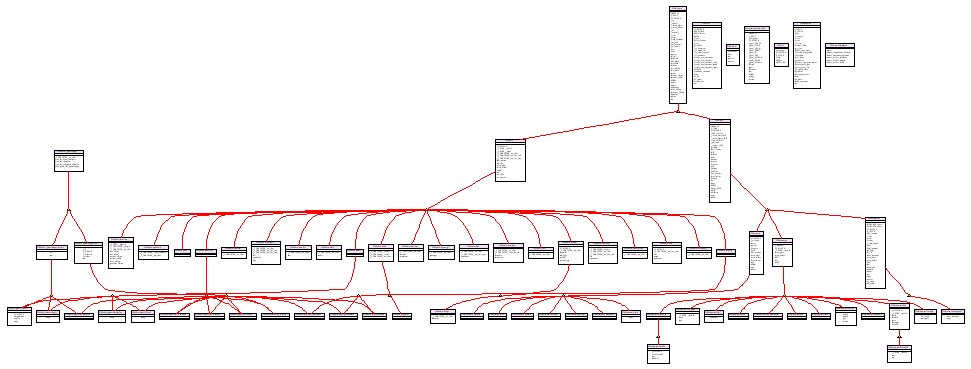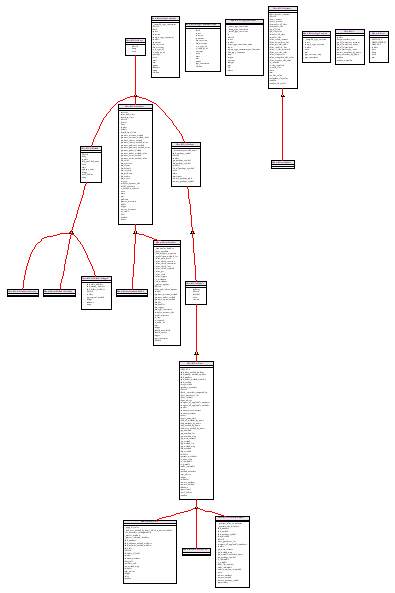NAME
UML::Class::Simple - Render simple UML class diagrams, by loading the code
VERSION
This document describes UML::Class::Simple 0.20 released by 7 December 2014.
SYNOPSIS
use UML::Class::Simple;
# produce a class diagram for Alias's PPI
# which has already installed to your perl:
@classes = classes_from_runtime("PPI", qr/^PPI::/);
$painter = UML::Class::Simple->new(\@classes);
$painter->as_png('ppi.png');
# produce a class diagram for your CPAN module on the disk
@classes = classes_from_files(['lib/Foo.pm', 'lib/Foo/Bar.pm']);
$painter = UML::Class::Simple->new(\@classes);
# we can explicitly specify the image size
$painter->size(5, 3.6); # in inches
# ...and change the default title background color:
$painter->node_color('#ffffff'); # defaults to '#f1e1f4'
# only show public methods and properties
$painter->public_only(1);
# hide all methods from parent classes
$painter->inherited_methods(0);
$painter->as_png('my_module.png');DESCRIPTION
UML::Class::Simple is a Perl CPAN module that generates UML class diagrams (PNG format, GIF format, XMI format, or dot source) automatically from Perl 5 source or Perl 5 runtime.
Perl developers can use this module to obtain pretty class diagrams for arbitrary existing Perl class libraries (including modern perl OO modules based on Moose.pm), by only a single command. Companies can also use the resulting pictures to visualize the project hierarchy and embed them into their documentation.
The users no longer need to drag a mouse on the screen so as to draw figures themselves or provide any specs other than the source code of their own libraries that they want to depict. This module does all the jobs for them! :)
Methods created on-the-fly (in BEGIN or some such) can be inspected. Accessors created by modules Class::Accessor, Class::Accessor::Fast, and Class::Accessor::Grouped are recognized as "properties" rather than "methods". Intelligent distingishing between Perl methods and properties other than that is not provided.
You know, I was really impressed by the outputs of UML::Sequence, so I decided to find something to (automatically) get pretty class diagrams too. The images from Autodia's Graphviz backend didn't quite fit my needs when I was making some slides for my presentations.
I think most of the time you just want to use the command-line utility umlclass.pl offered by this module (just like me). See the documentation of umlclass.pl for details.
SAMPLE OUTPUTS
- PPI
-
https://raw.githubusercontent.com/agentzh/uml-class-simple-pm/master/samples/ppi_small.png

(See also samples/ppi_small.png in the distribution.)
- Moose
-
https://raw.githubusercontent.com/agentzh/uml-class-simple-pm/master/samples/moose_small.png

(See also samples/moose_small.png in the distribution.)
- FAST
-
https://raw.githubusercontent.com/agentzh/uml-class-simple-pm/master/samples/fast.png

(See also samples/fast.png in the distribution.)
SUBROUTINES
- classes_from_runtime($module_to_load, $regex?)
- classes_from_runtime(\@modules_to_load, $regex?)
-
Returns a list of class (or package) names by inspecting the perl runtime environment.
$module_to_loadis the main module name to load while$regexis a perl regex used to filter out interesting package names.The second argument can be omitted.
- classes_from_files($pmfile, $regex?)
- classes_from_files(\@pmfiles, $regex?)
-
Returns a list of class (or package) names by scanning through the perl source files given in the first argument.
$regexis used to filter out interesting package names.The second argument can be omitted.
- exclude_by_paths
-
Excludes package names via specifying one or more paths where the corresponding modules were installed into. For example:
@classes = exclude_by_paths(\@classes, 'C:/perl/lib'); @classes = exclude_by_paths(\@classes, '/home/foo', '/System/Library'); - grep_by_paths
-
Filters out package names via specifying one or more paths where the corresponding modules were installed into. For instance:
@classes = grep_by_paths(\@classes, '/home/malon', './blib/lib');
All these subroutines are exported by default.
METHODS
$obj->new( [@class_names] )-
Create a new
UML::Class::Simpleinstance with the specified class name list. This list can either be constructed manually or by the utility functionsclasses_from_runtimeandclasses_from_files. $obj->as_png($filename?)-
Generate PNG image file when
$filenameis given. It returns binary data when$filenameis not given. $obj->as_gif($filename?)-
Similar to
as_png, bug generate a GIF-format image. Note that, for many graphviz installations,gifsupport is disabled by default. So you'll probably see the following error message:Format: "gif" not recognized. Use one of: bmp canon cmap cmapx cmapx_np dia dot fig gtk hpgl ico imap imap_np ismap jpe jpeg jpg mif mp pcl pdf pic plain plain-ext png ps ps2 svg svgz tif tiff vml vmlz vtx xdot xlib $obj->as_dom()-
Return the internal DOM tree used to generate dot and png. The tree's structure looks like this:
{ 'classes' => [ { 'subclasses' => [], 'methods' => [], 'name' => 'PPI::Structure::List', 'properties' => [] }, { 'subclasses' => [ 'PPI::Structure::Block', 'PPI::Structure::Condition', 'PPI::Structure::Constructor', 'PPI::Structure::ForLoop', 'PPI::Structure::Unknown' ], 'methods' => [ '_INSTANCE', '_set_finish', 'braces', 'content', 'new', 'refaddr', 'start', 'tokens' ], 'name' => 'PPI::Structure', 'properties' => [] }, ... ] }You can adjust the data structure and feed it back to
$objvia theset_dommethod. $obj->set_dom($dom)-
Set the internal DOM structure to
$obj. This will be used to generate the dot source and thus the PNG/GIF images. $obj->as_dot()-
Return the Graphviz dot source code generated by
$obj. $obj->set_dot($dot)-
Set the dot source code used by
$obj. $obj->as_xmi($filename)-
Generate XMI model file when
$filenameis given. It returns XML::LibXML::Document object when$filenameis not given. can_run($path)-
Copied from IPC::Cmd to test if $path is a runnable program. This code is copyright by IPC::Cmd's author.
$prog = $obj->dot_prog()$obj->dot_prog($prog)-
Get or set the dot program path.
PROPERTIES
$obj->size($width, $height)($width, $height) = $obj->size-
Set/get the size of the output images, in inches.
$obj->public_only($bool)$bool = $obj->public_only-
When the
public_onlyproperty is set to true, only public methods or properties are shown. It defaults to false. $obj->inherited_methods($bool)$bool = $obj->inherited_methods-
When the
inherited_methodsproperty is set to false, then all methods, inherited from parent classes, are not shown. It defaults to true. $obj->node_color($color)$color = $obj->node_color-
Set/get the background color for the class nodes. It defaults to
'#f1e1f4'. $obj->moose_roles($bool)-
When this property is set to true values, then relationships between Moose::Role packages and their consumers will be drawn in the output. Default to false.
$obj->display_methods($bool)-
When this property is set to false, then class methods will not be shown in the output. Default to true.
$obj->display_inheritance($bool)-
When this property is set to false, then the class inheritance relationship will not be drawn in the output. Default to false.
INSTALLATION
Please download and intall a recent Graphviz release from its home:
UML::Class::Simple requires the HTML label feature which is only available on versions of Graphviz that are newer than mid-November 2003. In particular, it is not part of release 1.10.
Add Graphviz's bin/ path to your PATH environment. This module needs its dot utility.
Grab this module from the CPAN mirror near you and run the following commands:
perl Makefile.PL
make
make test
make installFor windows users, use nmake instead of make.
Note that it's recommended to use the cpan utility to install CPAN modules.
LIMITATIONS
It's pretty hard to distinguish perl methods from properties (actually they're both implemented by subs in perl). Currently only accessors created by Class::Accessor, Class::Accessor::Fast, and Class::Accessor::Grouped are provided. (Thanks to the patches from Adam Lounds and Dave Howorth!) If you have any other good idea on this issue, please drop me a line ;)
Only the inheritance relationships are shown in the images. I believe other subtle relations may mess up the Graphviz layouter. Hence the "::Simple" suffix in this module name.
Unlike Autodia, at this moment only Graphviz and XMI backends are provided.
There's no way to recognize real perl classes automatically. After all, Perl 5's classes are implemented by packages. I think Perl 6 will make my life much easier.
To prevent potential naming confusion. I'm using Perl's
::namespace separator in the class diagrams instead of dot (.) chosen by the UML standard. One can argue that following UML standards is more important since people in the same team may use different programming languages, but I think it's not the case for the majority (including myself) ;-)
TODO
Add more unit tests.
Add support for more image formats, such as
as_ps,as_jpg, and etc.Plot class relationships other than inheritance on the user's request.
Provide backends other than Graphviz.
Please send me your wish list by emails or preferably via the CPAN RT site. I'll add them here or even implement them promptly if I'm also interested in your (crazy) ideas. ;-)
BUGS
There must be some serious bugs lurking somewhere; if you found one, please report it to http://rt.cpan.org or contact the author directly.
ACKNOWLEDGEMENT
I must thank Adam Kennedy (Alias) for writing the excellent PPI and Class::Inspector modules. umlclass.pl uses the former to extract package names from user's .pm files or the latter to retrieve the function list of a specific package.
I'm also grateful to Christopher Malon since he has (unintentionally) motivated me to turn the original hack into this CPAN module. ;-)
SOURCE CONTROL
You can always grab the latest version from the following GitHub repository:
https://github.com/agentzh/uml-class-simple-pm
It has anonymous access to all.
If you have the tuits to help out with this module, please let me know. I have a dream to keep sending out commit bits like Audrey Tang. ;-)
AUTHORS
Yichun "agentzh" Zhang (章亦春) <agentzh@gmail.com>, CloudFlare Inc.
Maxim Zenin <max@foggy.ru>.
COPYRIGHT
Copyright (c) 2006-2014 by Yichun Zhang (章亦春), CloudFlare Inc. Copyright (c) 2007-2014 by Maxim Zenin.
This library is free software; you can redistribute it and/or modify it under the same terms as perl itself, either Artistic and GPL.
SEE ALSO
umlclass.pl, Autodia, UML::Sequence, PPI, Class::Inspector, XML::LibXML.